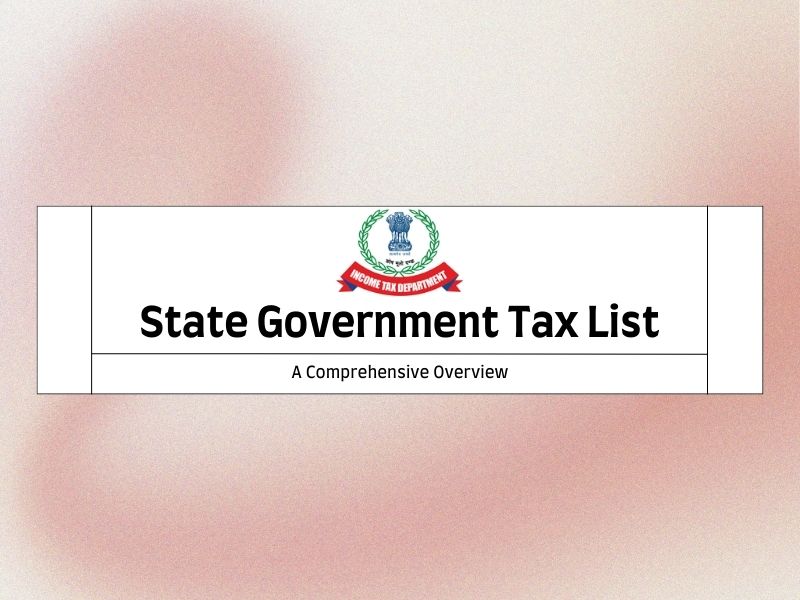When it comes to state government taxes, having a clear understanding of the types of taxes imposed at the state level is crucial. Each state within a country has its own taxation system to generate revenue for funding various public services and projects. In this comprehensive overview, we’ll delve into the different types of state government taxes that individuals and businesses may encounter. Let’s explore these taxes and their implications to gain a better grasp of the state-level financial landscape.
Table of Contents
- Introduction to State Government Taxes
- Income Tax: Supporting State Revenues
- Sales Tax: A Consumer Contribution
- Property Tax: Funding Local Initiatives
- Excise Tax: Specialized Goods and Activities
- Inheritance and Estate Tax: Passing on Wealth
- Business Tax: State-Level Commercial Levies
- Fuel and Gasoline Tax: Funding Transportation Infrastructure
- Transient Occupancy Tax: Stays in Hotels and Lodgings
- Conclusion
1. Introduction to State Government Taxes
State government taxes play a pivotal role in financing the operations of state governments. These taxes are designed to fund essential services, infrastructure development, education, healthcare, and other initiatives that directly impact the residents of a particular state.
2. Income Tax: Supporting State Revenues
One of the primary sources of state revenue is the income tax. Individuals and businesses operating within a state are subject to state income tax, which is usually calculated as a percentage of the income earned. State income tax rates and regulations vary from state to state, allowing each state to determine its own taxation structure.
3. Sales Tax: A Consumer Contribution
Sales tax is imposed on the purchase of goods and services. It’s a consumption-based tax that varies based on the state. While some states have a single statewide sales tax rate, others allow local governments to impose additional sales taxes, resulting in different total rates within a state.
4. Property Tax: Funding Local Initiatives
Property tax is levied on the value of real estate properties owned by individuals and businesses. This tax contributes significantly to funding local projects such as schools, libraries, public safety, and infrastructure maintenance. Property tax rates can differ widely between states and even within different localities of a state.
5. Excise Tax: Specialized Goods and Activities
Excise tax is applied to specific goods and activities, such as alcohol, tobacco, and fuel. This tax serves multiple purposes: generating revenue, discouraging consumption of certain products, and funding programs related to the taxed items. Excise tax rates can vary based on the type of product and state policies.
6. Inheritance and Estate Tax: Passing on Wealth
Some states impose inheritance and estate taxes on the transfer of assets after a person’s passing. These taxes are based on the value of the inherited or bequeathed assets. It’s important to note that not all states impose these taxes, and the ones that do may have varying exemption thresholds and rates.
7. Business Tax: State-Level Commercial Levies
Business taxes at the state level encompass a range of levies, including corporate income tax, franchise tax, and business privilege tax. These taxes contribute to the state’s revenue and support various services and projects that benefit both businesses and the community.
8. Fuel and Gasoline Tax: Funding Transportation Infrastructure
Fuel and gasoline taxes are applied to the purchase of fuel and are dedicated to funding transportation infrastructure projects. These taxes ensure that those who use roadways contribute to their maintenance and improvement.
9. Transient Occupancy Tax: Stays in Hotels and Lodgings
Transient occupancy tax, often referred to as a hotel tax or lodging tax, is levied on individuals who stay in hotels, motels, and other lodging establishments. This tax helps generate revenue for local governments and tourism-related initiatives.
10. Conclusion
In conclusion, navigating the array of state government taxes is essential for both individuals and businesses operating within a state. Each type of tax serves a specific purpose in funding various public services and projects that directly impact the lives of residents. By understanding the nuances of state-level taxation, individuals and businesses can better plan their financial strategies and contribute to the growth and development of their respective states. Remember, consulting with tax professionals and staying informed about tax regulations ensures a smooth experience within the state-level tax landscape.


